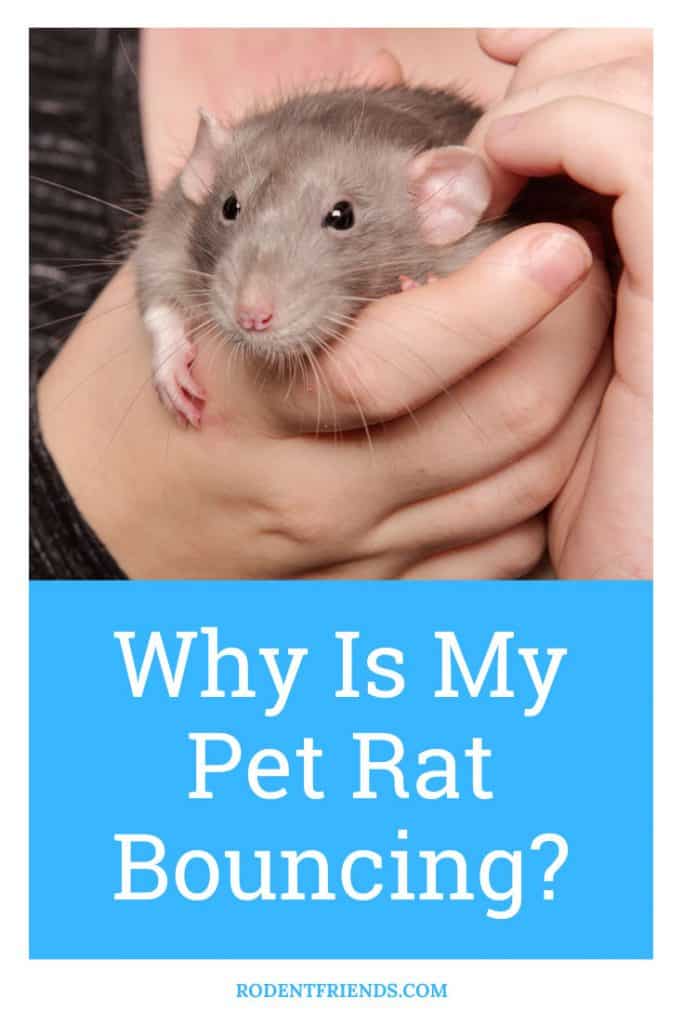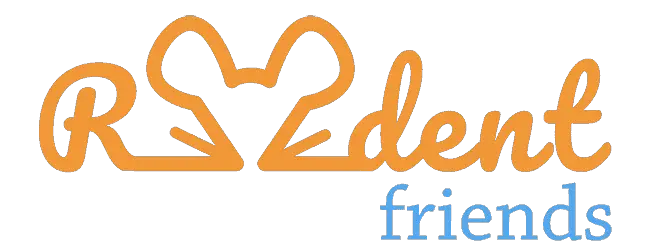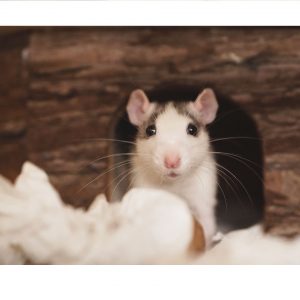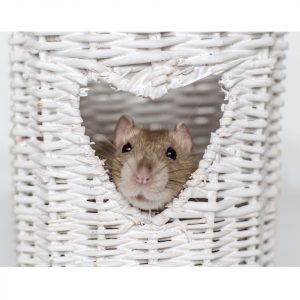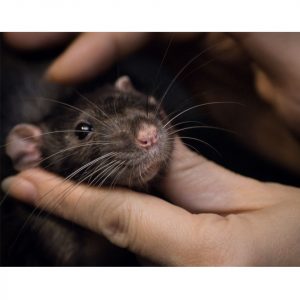How many of you start jumping like a child in your happiest moments? Just like that, rats have the ability to jump around, exhibit popcorn behavior, and run like crazy in their surroundings.
You could be worried if you observe your rat hopping around if you’re an inexperienced rat parent. You will question yourself, “why is my rat jumping like that?”
The majority of rats will hop around when they are excited or playful. This behavior could occur while they are sprinting around or just frozen in a place. The rats swiftly run around in the other direction and squeal.
Still, there is still a lot to learn about their jumping behavior.
Why is my rat bouncing around?
The main reason for your rat’s erratic behavior is that it is incredibly happy. While people often laugh, applaud, or cry in happiness, rats show these positive emotions through movement.
There are several videos online showing happy rats jumping around while engaging with their owners.
Rats also get zoomies when they are interacting with other rats. They would sprint together, climb on their backs, as well as engage in social grooming.
The rat would often start to hop around to start playing with its master or other rats. Additionally, researchers have discovered that a few rats like to be tickled.
Many rat parents have reported that they have observed this behavior. Some rats keep coming back and forth to their human’s hand to get tickles before sprinting all around their space. If your rat is making high-pitched squeaks, then it is a clear sign that it is happy at this moment.
Examining your rat’s ears will provide you further evidence that it is content while being tickled during playtime. Researchers have discovered that straight, pink ears are a sign of happiness in rats.
Can rats get zoomies?
Most animal parents have read about dog zoomies coming up after a thorough rinsing session or cat zoomies occurring as the sun sets. It may come as a surprise that rats also exhibit “zoomie” behavior.
The rat zoomie behavior involves the rodent running erratically around a space, such as a cage.
The sprints might take the form of quick loops or long routes around a person and object. The rats constantly come back and forth to their master or other rodents for attention while taking loops.
A rat would usually make high-pitched squeaks in addition to sprinting and hopping.
Some rat vocalizations are so high-pitched that they could get unbearable for people to hear.
Researchers have discovered that people can only bear vocalizations like rat “laughs” using specialized instruments as these ultrasonic frequencies can go from 22kHz to 100,000 Hz.
A human ear can hear sounds that lie in a frequency range between 20 Hz to 20 kHz.
You can read more about why a rat squeaks, right here!
A group of rats leaping around could stop for communal grooming or even engage in some wrestling. They like playing and scuffling in a similar way as children and dogs.
Fast-moving rat zoomies would barely stop for a short time to groom and continue with their race.
Are rat zoomies dangerous?
Rat zoomies are not at all dangerous. The constant scurrying and hopping reflect how wild rats communicate with their species.
For young rats, that are developing social skills, running, playing, and battling are important for their growth.
Rat’s zoomies’ behavior might be misinterpreted as a sign of a neurological condition because it seems abnormal to humans. Luckily, all that crazy hopping and screeching is simply a happy gesture.
Sadly, most people have negative opinions of rodents as filthy creatures who invade houses and spread diseases.
Rats are actually quite friendly and intelligent creatures. Moreover, they constantly groom themselves and are much cleaner than people think.
What is popcorning, and why is my rat popcorning?
Popcorning is another cute behavior that rats exhibit. Just like zoomies, it can either start while your rat is standing or when it is running around.
A rat may bounce, jump, spin, and pop the same way a kernel of popcorn jumps out of the pan. Popcorning might appear unstable, even alarming.

However, there’s no need to be concerned. It is a very common behavior.
Experience this cheerful behavior as long as your rat wants to play more with you and is happy in the moment.
The most common explanation of popcorning is happiness, although fear can also be the culprit.
Popcorning may indicate distress, panic, or uncontrollable shaking. For instance, many rats will popcorn due to the sound of a vacuum.
Does this indicate he likes or dislikes the vacuum? It varies.
Pay attention to your rat’s body movements.
It’s not a good sign if he’s hiding, wide-eyed, or screeching in fear during that specific episode of popcorning.
Take note of what happens whenever your rat popcorns. If fear is the reason, you should identify and eliminate the source.
If they are thrilled while popcorning, then their joy is visible on their furry faces.
Whenever a rat is a popcorning, it is communicating to its rat mates that it is content or willing to play.
You’ll notice that rats in their juvenile stage are more energetic and show this behavior; however, as they get old they prefer to sit quietly and become your cuddle partners.
How can I get my rat to popcorn?
It is not necessary that every rat will show popcorn behavior.
However, many rat owners have discovered that if you interact with them during a play session, you can encourage them to popcorn while having finger wrestling.
You can hold them in your hands, turn them around, and try to tickle their stomachs lightly with your fingers.
You can tell if they enjoy this tickling time if they try to grab your hand and attempt to have a wrestling session.
My rat never popcorns? Is he not happy?
Don’t be concerned if your rat is not likely to show popcorn behavior. It does not imply that it is sad.
Just like people, many rats are shy. Energetic zoomies are a clear indicator that your rat is having fun, but a calm rat may express he’s happy through other means.
He could show his emotional well-being by stretching his feet and toes or having a shut eye around you.
He may also give you a few kisses and express how much he likes the chin scratches.
Maybe the rat purrs with joy when you hand him the new toys and snacks.
If they look for you and look forward to spending time with you, then that clearly shows they are happy!
Do rats get excited?
When being tickled, petted, or cared for, rats exhibit some interesting behaviors.
Whether they like getting their chins scratched, their ears would get pink and fall down freely, and they would try to communicate with you as if they are laughing.
They might also get so excited about the activity at hand that they’ll show energized behavior such as we’ve seen throughout this article.
Bouncing, zooming and popcorning are all clear signs of excitement!
What noise do rats make when they are happy?
Rats who are pleased would also engage in teeth grinding and make a purring sound.
Other joyful rat noises are chirps, fast squeaks, and hisses.
If rats sense a surprise heading towards them, like a piece of cheese, they might make a cheerful chirping sound.
Pet rats usually aren’t vocal animals, since they don’t need it to communicate between them.
They are vocal among the same species, just at a frequency that we can’t listen to.
So when they squeak, it’s a way of communicating with you. Whether they’re happy or not, they’ll let you know.
Why is my rat vibrating when I pet it?
It’s important not to misinterpret this behavior as ear flapping or shaking, which happens if you sense a rat visibly tremble or vibrate in your palm.
The rat actually begins to vibrate at its feet, and it often seems stressed and on the verge of exploding.
The rats are physically doing this because they are experiencing emotions that are too strong for them to convey.
It might indicate nervousness, but it could also indicate great enthusiasm or fear.
You need to examine the rat’s entire body movement to identify what it is experiencing.
An energetic rat would simply not sit quietly, would be looking around and sniffing, making fast body movements, and would try to channel its energy into doing something.
While an anxious or terrified rat might still scurry and hop around, their main emphasis would be to hide, tremble, or move far away from the unfamiliar item.
Pet rats show visible fear through their bodies.
In most cases, according to experts, you have a rat that is experiencing a unique blend of both emotions; therefore, they are both highly energetic and afraid and don’t know how to react.
These rats display aggressive exploring drive as well as intense anxiety, and they often require a lot of reinforcement before they calm down to the point where they could build confidence.
Why does my rat wag his tail when I pet him?
Tail wagging can include the entire tail or just the tip. The reason why rats’ tails wag is questionable; however, it seems to be related to feelings of stress and enjoyment.
For instance, rats might wiggle their tails while engaging in violent activities with other rats or when confronting their predator.
When this happens, you’ll notice that your pet rat will want to fight or lunge at whatever is stressing or annoying them.
On the other hand, if they’re sitting quietly, while you pet them, then it’s a sign of enjoyment.
If your pet rat weren’t enjoying those pets, it would try to run away from you and your pets.
Why does my rat squeak when I pet him?
Rats squeal when picked up and petted since they want to express if they are pleased, anxious, or frightened.
The way your rat behaves when screeching will often indicate the signals it wants to convey.
Again, pet rats will squeak to let you know something. If they make no sign of moving or retracting from your pets, then it’s a sign that they’re pleased with the attention.
The squeak might be accompanied by some boggling eyes which, even if it seems scary when seen for the first time, usually indicates that your pet rat is happy.
